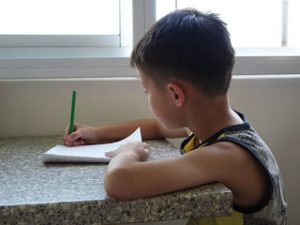 It’s part of the American ethos that hard work yields results. We apply this philosophy to our sports teams, our careers and, yes, our children’s education.
It’s part of the American ethos that hard work yields results. We apply this philosophy to our sports teams, our careers and, yes, our children’s education.
At many schools, elementary-aged children are assigned an hour or more of homework each night. While many subscribe to the concept that practice makes perfect, there is a counter-argument that says kids need time for free play to develop language, regulate their behavior, and learn about risk-taking. So what does the evidence say about homework? And what can parents do to support their child’s education?
There are at least a half dozen systematic reviews about the importance and effectiveness of homework, and all of its nuances. The Center for Public Education and the Association for Supervision and Curriculum Development both provide comprehensive essays that summarize the evidence on homework.
One 2007 analysis published by Duke University researchers, which includes 50 separate studies focused on the specific question, “Does homework improve academic achievement?” This study followed an earlier meta-analysis of approximately 100 studies published by the same researchers in 1989. Both reviews concluded that homework does help to improve academic achievement, primarily during middle and high school. For children in elementary school, the review concludes that while homework can help children develop good study habits, it does not help to improve students’ grades or standardized test scores.
Based on the body of evidence, here are some other interesting take-home messages about homework:
- Students are more likely to complete and learn from homework assignments that have a purpose, for example, reviewing important concepts, improving students’ independence or providing opportunities to explore topics of interest to students.
- Homework assignments are most successful when they are easy enough for students to complete independently but challenging enough to be interesting.
- Finding appropriate ways to involve parents with their children’s homework leads to improved academic performance.
- Homework provides more academic benefits for older students. For younger students, some homework can help them to establish study habits and routines, but too much homework detracts from family and play activities after school.
- There is strong evidence that homework improves learning for students with learning disabilities, most likely because these students benefit from additional time to practice new skills.
Especially for students with disabilities, it is important for parents to support children in completing their homework. But for younger children, the research shows there are much more effective ways for parents to support academic achievement. A Canadian research organization published a literature review that spells out the best ways parents can support their children academically. Helping kids with homework doesn’t make the list. Here’s what does:
- Establish high, but reasonable, expectations of how your child will perform in school. The best way to do this is to communicate your belief in your child’s potential.
- Talk with your children about their school days. A large study of U.S. students found that parents talking with children about school activities and programs had a greater impact on academic achievement than parental volunteering, monitoring kids’ homework or limiting TV time.
- Help your children develop positive attitudes and strong work habits. This includes helping kids handle distractions, negotiating crises of confidence, praising persistence and handling difficulties while remaining positive about school as a whole.
- Read with your children and talk to them about what they are reading. This doesn’t teach them the fundamentals of phonics, but it does build a foundation for comprehension, oral language skills and a love for reading that are critical throughout their education.
The take-home message: Yes, homework is necessary—especially in the middle and high school years. But for younger children, there are more effective ways to support their learning experiences.



Speak Your Mind